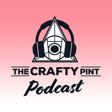
25 Years Of Holgate
It’s fair to say Episode 017 of The Crafty Pint Podcast is a special one. After all, you can count the number of people who’ve achieved what this week’s guests have achieved on one hand.
It was all the way back in 1999 that Paul and Tash Holgate sold the first Holgate beers, long before “craft beer” was a term – it was “boutique beers” and “microbreweries” in those days – and a full decade before the industry’s growth really started to go into overdrive. Little Creatures hadn’t yet launched, and Mountain Goat were barely two years into their adventure down the road in Melbourne.
Now, 25 years on, they occupy rarified territory: marking their quarter-century milestone while still independent, still running the business hands-on, still making plans for the years ahead, and all while producing some of the finest beers of their history to date.
We joined Paul and Tash in the bar of the pub in Woodend that has acted as their home since they moved the brewery out of the family home in their first few years of operation.
There, they reflected on the early years, when they were raising a very young family at a time when even getting their hands on things as straightforward and essential as ingredients and packaging was a tall order, and when most venues they approached dismissed their beer as homebrew.
We hear their take on the rise of the craft beer industry, how they’ve navigated the changes as it evolved into something well beyond their expectations, the hurdles they’ve faced and successes they’ve enjoyed over the past quarter-century, and how they’ve gone about celebrating their 25 Years of Beers.
You couldn’t wish to spend time in the company of a more down-to-earth and genuine couple, or to meet two people still so clearly loving what they do, even in the face of the challenges that have arisen in recent years.
The chat with Paul and Tash begins at 09:30
Prior to that, Will and I discuss two fun stories we published this week: one on a mini-revival for beer in bottles – notably longnecks; the other looking at the reasons behind the rise of hops from New Zealand both here and globally in the past couple of years.
We also touch on the news that Australia’s first non-alc brewing company, the Indigenous-led Sobah Beverages, is looking to sell its brewery and taproom on the Gold Coast, and the impending opening of two regional breweries in Victoria: the all-new Bendigo Brewing and a new, larger site in Castlemaine for Shedshaker.
Relevant links:
Back On The Bottle: https://craftypint.com/news/3617/back-on-the-bottle
Choice Az! The Rise Of Kiwi Hops: https://craftypint.com/news/3623/choice-az-the-rise-of-kiwi-hops
Sobah Beverages Downsizing: https://craftypint.com/news/3619/sobah-beverages-put-brewery-on-market-and-plan-to-downsize
Bendigo Brewing Opening: https://craftypint.com/event/13512/bendigo-brewings-grand-opening-weekend
James on The Do Landers Podcast: https://thedolanders.com/
Holgate Brewhouse: https://craftypint.com/brewery/156/holgate-brewhouse
Holgate ESB: https://craftypint.com/beer/10917/holgate-brewhouse-esb
Holgate x Noodledoof Dank AF: https://craftypint.com/beer/10855/holgate-x-noodledoof-dank-af-west-coast-ipa
Paul & Tash: https://craftypint.com/news/2255/craftys-advent-calendar-paul-and-tash-holgate
Bintani: https://www.bintani.com.au/
To find out more about supporting the show or otherwise partnering with The Crafty Pint, contact craig@craftypint.com.
